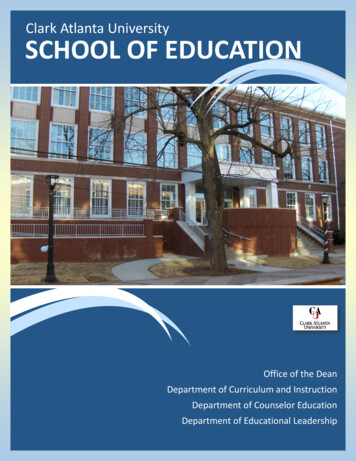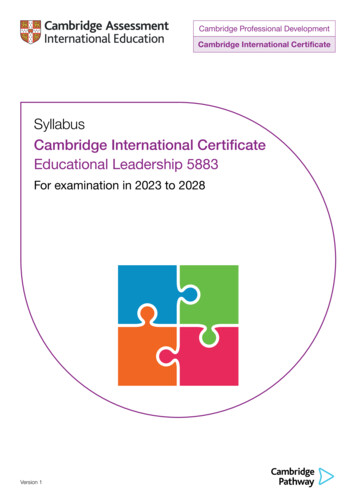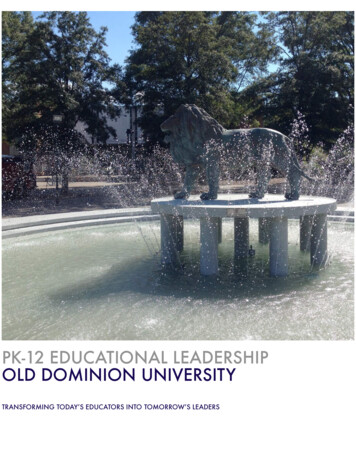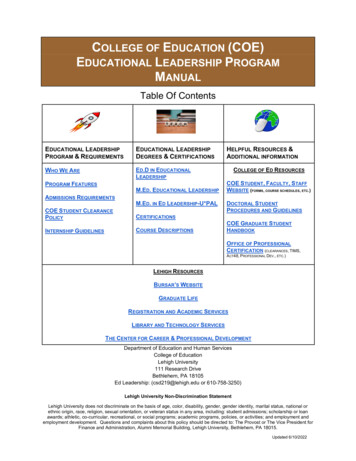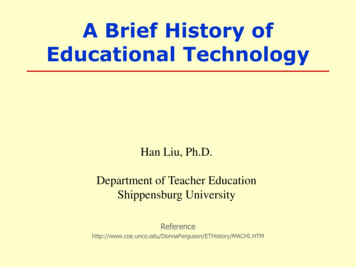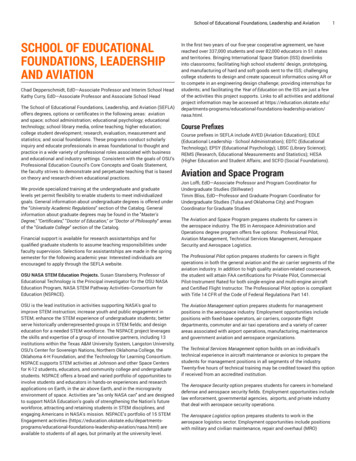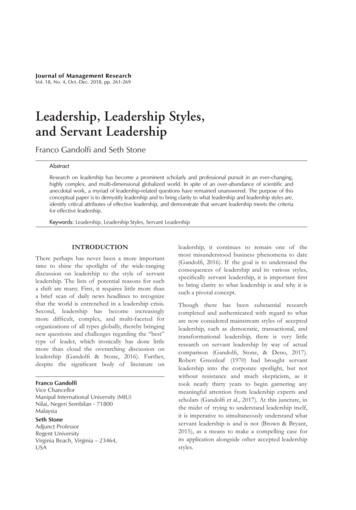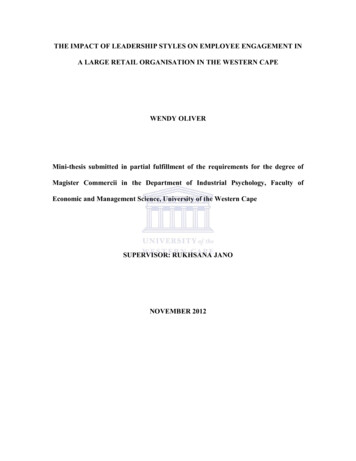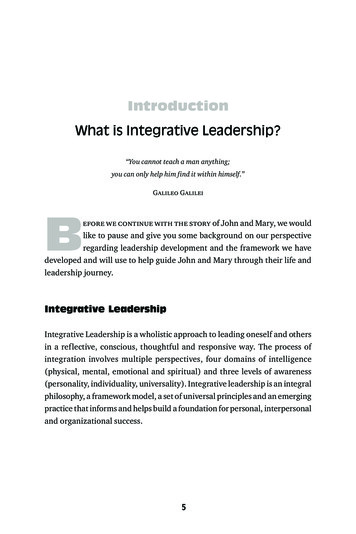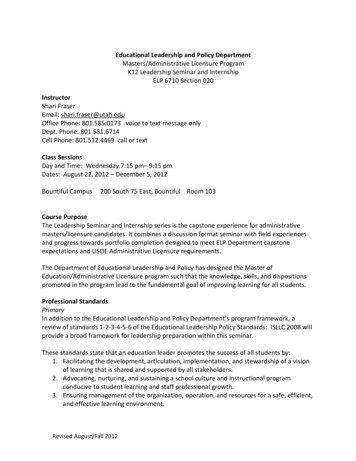
Transcription
Educational Leadership and Policy DepartmentMasters/Administrative Licensure ProgramK12 Leadership Seminar and InternshipELP 6710 Section 020InstructorShari FraserEmail: shari.fraser@utah.eduOffice Phone: 801.585.0173 voice to text message onlyDept. Phone: 801.581.6714Cell Phone: 801.512.4469 call or textClass SessionsDay and Time: Wednesday 7:15 pm– 9:15 pmDates: August 22, 2012 – December 5, 2012Bountiful Campus200 South 75 East, Bountiful Room 103Course PurposeThe Leadership Seminar and Internship series is the capstone experience for administrativemasters/licensure candidates. It combines a discussion format seminar with field experiencesand progress towards portfolio completion designed to meet ELP Department capstoneexpectations and USOE Administrative Licensure requirements.The Department of Educational Leadership and Policy has designed the Master ofEducation/Administrative Licensure program such that the knowledge, skills, and dispositionspromoted in the program lead to the fundamental goal of improving learning for all students.Professional StandardsPrimaryIn addition to the Educational Leadership and Policy Department’s program framework, areview of standards 1-2-3-4-5-6 of the Educational Leadership Policy Standards: ISLLC 2008 willprovide a broad framework for leadership preparation within this seminar.These standards state that an education leader promotes the success of all students by:1. Facilitating the development, articulation, implementation, and stewardship of a visionof learning that is shared and supported by all stakeholders.2. Advocating, nurturing, and sustaining a school culture and instructional programconducive to student learning and staff professional growth.3. Ensuring management of the organization, operation, and resources for a safe, efficient,and effective learning environment.Revised August/Fall 2012
4. Collaborating with faculty and community members, responding to diverse communityinterests and needs, and mobilizing community resources.5. Acting with integrity, fairness, and in an ethical manner.6. Understanding, responding to, and influencing the political, social, economic, legal andcultural contexts.SecondaryThe seminar will also address standards one through six of the Utah Educational LeadershipStandards that were adopted by the USOE in 2011 (http://www.uen.org/k12educator/uels/).1. Visionary LeadershipAn educational leader promotes the success of every student by facilitating thedevelopment, articulation, implementation, and stewardship of a vision oflearning that is shared and supported by all stakeholders.2. Teaching and LearningAn educational leader promotes the success of every student by advocating,nurturing and sustaining a school focused on teaching and learning conducive tostudent, faculty, and staff growth.3. Management for LearningAn educational leader promotes the success of every student by ensuringmanagement of the organization, operation, and resources for a safe, efficient,and effective learning environment.4. Community CollaborationAn educational leader promotes the success of every student by collaboratingwith faculty, staff, parents, and community members, responding to diversecommunity interests and needs and mobilizing community resources.5. Ethical LeadershipAn educational leader promotes the success of every student by acting with, andensuring a system of, integrity, fairness, equity, and ethical behavior.6. Systems LeadershipAn educational leader promotes the success of every student by understanding,responding to, and influencing the interrelated systems of political, social,economic, legal, policy, and cultural contexts affecting education.Office HoursThe instructor is available for consultation. Please contact by email for day/time. Feedback onassignments is offered at any time prior to the final due dates.Communication ResourcesElectronic technology tools including email, remote access to the Marriott Library, CANVAS, etc.will be used for communicating with colleagues, obtaining course materials, doing research,completing assignments and assessments, and other tasks.Revised August/Fall 2012
Course RequirementsTo maximize learning opportunities, students are expected to be present and prepared for eachclass, to participate in class, and complete all assignments on time. Late assignments willreduce in total score by 10% for each day late unless other arrangements have been approvedby instructor. Class participation includes attendance and punctuality, actively listening, andthoughtfully contributing to class dialogue, and any activities determined by the instructor.Missing class may affect your class participation grade.The syllabus identifies weekly readings that must be completed prior to the class meeting forwhich they are assigned. Additional readings may be required and will be handed out in classor posted in canvas. In addition to these readings, students are encouraged to provide relevantmaterial and resources to stimulate discussion, learning, and action in the field.Occasionally, extenuating circumstances arise that keep individuals from attending a regularlyscheduled class meeting. Class participants are responsible for notifying the instructor prior tomissing a class and for getting class notes or class content information from a classmatefollowing the missed class.Course AssignmentsSeminars may include discussions, guest speakers, case study analyses, problem basedlearning, skills practice, individual/group project work time, and sharing of establishedand developing expertise. Portions of the seminar sessions may be facilitated by classmembers, with content based on work being done for the ePortfolio.Required Textbook/ReadingsPatterson, Grenny, McMillan, Switzler (2012) Second Edition PaperbackCrucial Conversations: Tools for Talking When Stakes are HighISBN: 978-0-07-17713-0 in bookstore or can be ordered through AMAZON, etc.All additional readings will be posted on CANVAS or provided by instructor.ePortfolioThe Internship ePortfolio includes ongoing documentation of work required to obtainthe recommendation for an administrative endorsement to the Utah Educator Level 2/3License. Copies of the Portfolio Guidelines were distributed and discussed SummerSemester 2012. A copy of the Portfolio Guidelines is located on CANVAS. Specific duedates for Portfolio items will be included in the Fall and Spring syllabi.Recommendations for graduation and licensure will depend on completion of allePortfolio requirements by May, 2013. Those planning to apply for administrativepositions for the 2013-2014 school year will not be qualified if the all coursework,testing, and internship requirements are incomplete.Revised August/Fall 2012
Intern VisitsIntern visits will be scheduled individually and will continue until licensing requirementsare complete. Therefore, interaction will be maintained between the instructor andstudents through Spring Semester, 2013; and beyond as needed.Grading Procedures1. Attendance and Participation2. Class assignments3. Portfolio progress thru end of Fall Term4. Project (individual or group presentation)10%20%50%20%Class Assignments1. Crucial Conversation2. Resume and Cover Letter3. Interview Activity202020Crucial ConversationEach student will participate in two small group discussions that are specific totopics and exercises connected to the course textbook. Further details about theinformation required for each small group discussion will be handed out in class.Resume and Cover LetterEach student will complete a resume and cover letter for current and futureadministrative applications. Resume and cover letter will be an in-classassignment will be peer reviewed prior to canvas submission.Interview ActivityEach student will participate in a class activity that involves mock interview andreview of feedback.Assignments for Portfolio see internship and portfolio guide for description1. Intern Log2. Leadership Reflections (minimum of four)3. ISLLC Standards Project and Reflection (3 and 4 of 6)4. Leadership ChecklistProjectChoose one of four options (add’l 20 intern hours)a. Curricular Auditb. Visionary Leadershipc. Law and Ethics in Special Educationd. Leadership and Diversity in K12Revised August/Fall 20122040402050
SLLA Practice and ReviewThe School Leaders Licensure Assessment test (0411) is required of all students seekingadministrative licensure. Students will register and take the SLLA 0411 test during springsemester 2013. Portions of the seminar class will include a review and practice of the test.There will also be three practice test on CANVAS throughout the semester.Written WorkAll written work should be typed, formatted, and void of grammatical, spelling andtypographical errors. In addition to being clear, concise, and organized, written work should bereflective, analytical, and incorporate literature and research from the course as well as outsidereadings to support discussion and arguments.Students should use the 5th Edition of the APA Manual as a guideline for bias-free writing,formatting, and appropriate citations. Also, please take time to proofread your papers beforesubmitting them. Finally, if you have concerns about your writing, please discuss this matterwith me before assignments are due.Grading ScaleThe grading scale for the course is:93 – 10090 – 9286 – 8983 – 8580 – 82AAB BB-Course ScheduleDate8/22Brief AgendaOverview of SyllabusLeadership Skills ReviewePortfolio ReviewSLLA Introduction8/29*Computer Lab ePortfolioReview of ISLLC 2008 & UEL 2011Intern Project & Syllabus UpdateCrucial ConversationsSLLA Test TipsRevised August/Fall 2012Readings/Assignments DueBring copies of ISLLC Activities to import into ePortfolio*Articles: ISLLC and UELS StandardsCrucial Conversations Ch 1 - 3Leadership Reflection and Intern Log DUE
9/5Guest Speaker:Rita Stevenson Davis School DistrictWorld Languages Supervisor‘Not one less’9/12The Role of Assistant PrincipalsCrucial ConversationsSLLA Topic Review I & IICrucial Conversations Ch 4 – 6*9/19Guest Speakers: Asst PrincipalsInterview ProcessSLLA Topic Review & Test Tips*Article: Mentoring Leadership9/26CLASS IN CANVASSLLA ON CANVAS!Leadership Reflection and Intern Log DUESpecial Education Part ONECrucial ConversationsResume and Cover Letters IntroArticle: A Special Role10/10No ClassFall Break10/17No ClassUEA10/24Guest Speaker: Dr Kerrie NaylorUSOE in Administrative Licensure“New USOE Standards for Teacherand Administrator Effectiveness”10/31CLASS IN CANVAS11/7Article: Marketing Campaigns and Initiations Rituals11/14Special Education Part TWOGuest Speakers:Resume and Cover LettersInterview Process11/21CLASS IN CANVASSLLA ON CANVAS!11/28The Importance of NETWORKINGGuest Speakers:ISLLC Activity 4 DUELeadership Checklist DUE HARD COPYLeadership Reflection and Intern Log DUE10/3Crucial Conversations Ch 7 – 9*SLLA ON CANVAS!ISLLC Activity 3 DUELeadership Reflection and Intern Log DUERevised August/Fall 2012*Bring a draft of your resume and cover letterto class.Interview Activity
12/5Group or Individual Presentationson Intern Projects*Leadership Checklists returned to interns.Looking ahead to Spring University PoliciesThe University of Utah seeks to provide equal access to its programs, services, andactivities for people with disabilities. If you will need accommodations in this class,reasonable prior notice needs to be given to the Center for Disability Services (CDS), 162Olpin Union Building, phone 801.581.5020 (V/TDD), website (www.sa.utah.edu/ds).CDS will work with you and the instructor to make arrangements for accommodations.All written information in this course can be made available in alternative format withprior notification to the Center for Disability Services.Academic Policies, Procedures, & RegulationsPlease refer to the University of Utah Student Handbook and University of Utah on-linecatalog regarding policies and procedures for grading, attendance, course incompletes,and academic honesty. Additionally, Department guidelines for academic study may befound in the Department Student Handbook, Department website, Departmentprogram literature, or Department Policy Handbook.Academic HonestyAcademic honesty is an expression of an ethic of interpersonal justice, responsibility,and care applicable to students, faculty, and staff. It demands that the pursuit ofknowledge in the university community be carried out with sincerity and integrity. Astudent who engages in academic dishonesty or who violates the professional andethical standards for the profession or discipline for which the student is preparing maybe subject to academic sanctions, as defined in the University Code, including but notlimited to a grade reduction, failing grade, suspension, or dismissal from the program orthe University. See the University of Utah Student Handbook - University Code, SectionII (www.admin.utah.edu/ppmanual/8/8-10.html) Student Standards of AcademicPerformance - Part C Academic Misconduct for further details.HarassmentThe University of Utah does not tolerate racial, sexual, or other forms of harassment ofstudents, faculty, or staff. If you feel you are subject to such harassment, you shouldnotify your instructor. If you feel you are subject to harassment by your instructor,contact the Chair of the Department of Educational Leadership & Policy- Dr. Paula Smithat 801.581.6714; or the Dean of the College of Education at 801.581.8221.Electronic DevicesCell phones, ipods and other electronic devices are generally not needed for classpurposes and use will be limited to break time. Computer use by students is permittedRevised August/Fall 2012
as relevant for class purposes only: note-taking, internet searches as part of in-classassignments, presentations, etc. Exceptions should be arranged with the Instructorbefore class starts.Additional ReadingsBolman, L.G., & Deal, T.E. (2003). Reframing organizations: Artistry, choice, and leadership (3rded.). San Francisco, CA: Jossey-Bass.Dunklee, Dennis R., (2000). If you want to lead, not just manage: A primer for principals.Thousand Oaks, CA: Corwin Press, Inc.Revised August/Fall 2012
In addition to the Educational Leadership and Policy Department's program framework, a review of standards 1-2-3-4-5-6 of the Educational Leadership Policy Standards: ISLLC 2008 will provide a broad framework for leadership preparation within this seminar. These standards state that an education leader promotes the success of all students by: 1.
